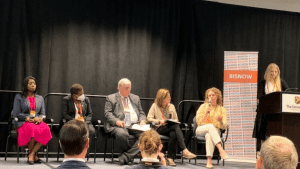
Growing Your Growth Mindset
The Great Resignation—it’s the trend we’ve been seeing in the workforce for the past few months, and it won’t be slowing down anytime soon.
Whether an employer or an employee, there’s little doubt the workplace has changed irreversibly. Many employees thrive working from home and have proven that they can be just as productive. Successful employers adapted and worked to accommodate this new way of thinking, while those employers that stayed rigid in their old ways lost talent in the sea of the Great Resignation.
And it’s not just employers that need to think flexibly. The pandemic has made us realize that having a one-track mind no longer serves us well. The idea that we are defined by a set of labels and stuck in one trajectory is outdated and needs to change.
More than 30 years ago, American psychologist and researcher Carol Dweck and her colleagues studied the behavior of children who had differing attitudes about success and failure. She realized the underlying beliefs that these kids had led to behaviors that either facilitated their growth, learning, and success or resulted in failure and discouragement. She coined the terms ‘growth mindset’ and ‘fixed mindset’ to describe these beliefs.
The adult mind works in the same way – contrary to prior belief, our brains are not hard-wired with fixed circuits. Neuroplasticity is the ability of the brain to continuously change throughout our lives.
Source: https://www.mindsetworks.com/science/Impact
How do you know if you have a fixed mindset? Consider these points:
- Other people’s successes tend to threaten you or make you envious.
- Constructive feedback makes you feel defensive or attacked.
- You believe you have all the answers and you don’t need anyone else’s help or support.
- You may think that your skills are fixed, or that it is too late to learn something new.
- Challenging situations are something you avoid because you don’t want to risk failure.
Looking at your career, finances, personal life, hobbies, and interests, do any of these resonate with you?
If they do, never fear—there is no time like the present to start moving towards a flexible mindset, or as neuroscientists call it, “cognitive shifting.” If you’ve cultivated a fixed mindset pattern for a long time it may be a little tough to make the shift at first, but keep at it. Here are some tips you can employ to help you:
1) Be aware of what words you’re telling yourself when you’re facing a new challenge or obstacle.
Are you telling yourself “I can’t learn how to do this right now?” Or, when someone gives you feedback do you immediately tell them “I know what I’m doing, I’ve been doing this a long time, but thanks?” These words are often a product of our limiting beliefs that have contributed to a fixed mindset.
2) Try changing up your language to that which is more open and positive.
Instead of using limiting language, say to yourself “let me give this a try,” or “thanks, let me take your feedback and see what I can do better.” Even if you’re not totally feeling it just yet, just saying the words can start to change your mindset into a more flexible one.
3) Remember the concept of neuroplasticity!
There are over 40 years of research on neuroplasticity, and it’s a generally accepted concept that the brain is far from being “fixed” when we reach adulthood. When something unexpected (like a global pandemic…) hits us, our brains can adapt to new ways of doing things. You don’t have to wait for a big event to happen, though. Everyday tasks can also be seen as opportunities to be more fluid and open to possibility.
4) Appreciate the process.
Remember the process of learning is much more important than the actual results you get from it. No matter the results, appreciate what you can further learn and keep going. If you’re faced with a new challenge, trying something new and getting an undesired result is still much better than giving up altogether.
5) Develop your sense of purpose.
According to Carol Dweck, when you have a growth mindset, you have a greater sense of purpose. When you’re faced with a challenge or criticism, tap into your values and identify the bigger meaning of the task at hand, and align yourself to this.
6) Start saying “not yet” rather than “no.”
When asked if you can do something new and challenging, instead of just flat out saying “no,” start saying “not yet.” This gives an immediate way to reframe your thought process to one of growth.
In addition to the above, here are a few questions you can ask yourself daily to challenge your fixed mindset according to Carol Dweck’s book Mindset: The New Psychology of Success.
- What can I learn from this?
- What steps can I take to help me succeed?
- What information can I gather? And from where?
- Where can I get constructive feedback?
- What did I learn today?
- What mistake did I make that taught me something?
- Is my current learning strategy working? If not, how can I change it?
- What did I try hard at today?
- What habits must I develop to continue the gains I’ve achieved?
In 2022 and beyond, I hope you’re able to tap into some of these tips and questions to move towards a flexible or growth mindset, if you haven’t already!
If you are interested in learning more tools and skills to shift to a growth mindset, or receiving 1:1 coaching to guide you to a transformed life, please contact me at [email protected] – send me a note to say hi, and let’s see how I can help you get there!
- About the Author
- Latest Posts
Deepa Kumar is a Transformation Coach who works with professional women in the Life Sciences. She is also a Solutions Consultant at an enterprise information management company that services the Life Sciences industry, as well as a long time Lean Six Sigma Black Belt. She enjoys bringing all of her skills together to help her coaching clients with personal continuous improvement so they can make a bigger impact in the world.







